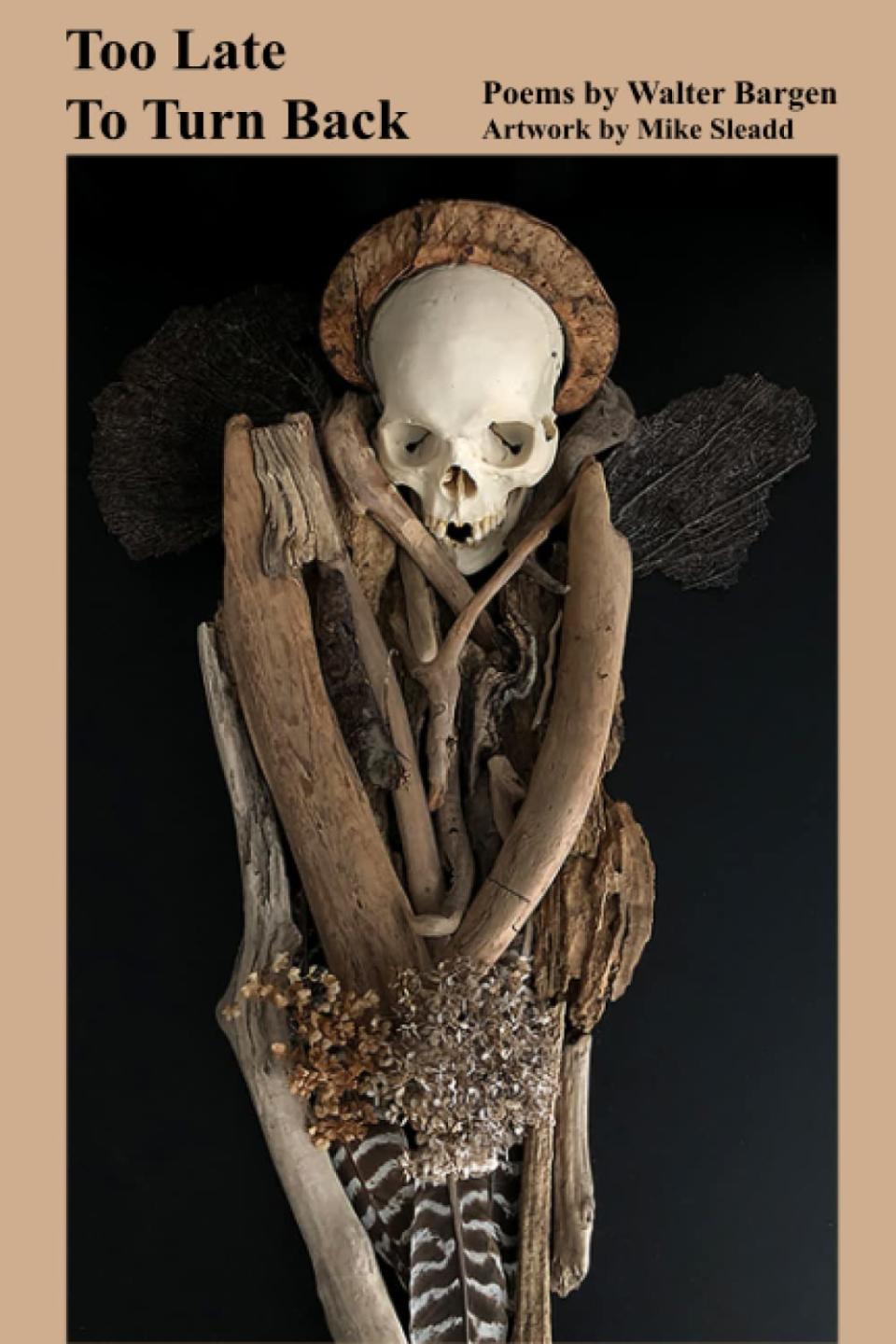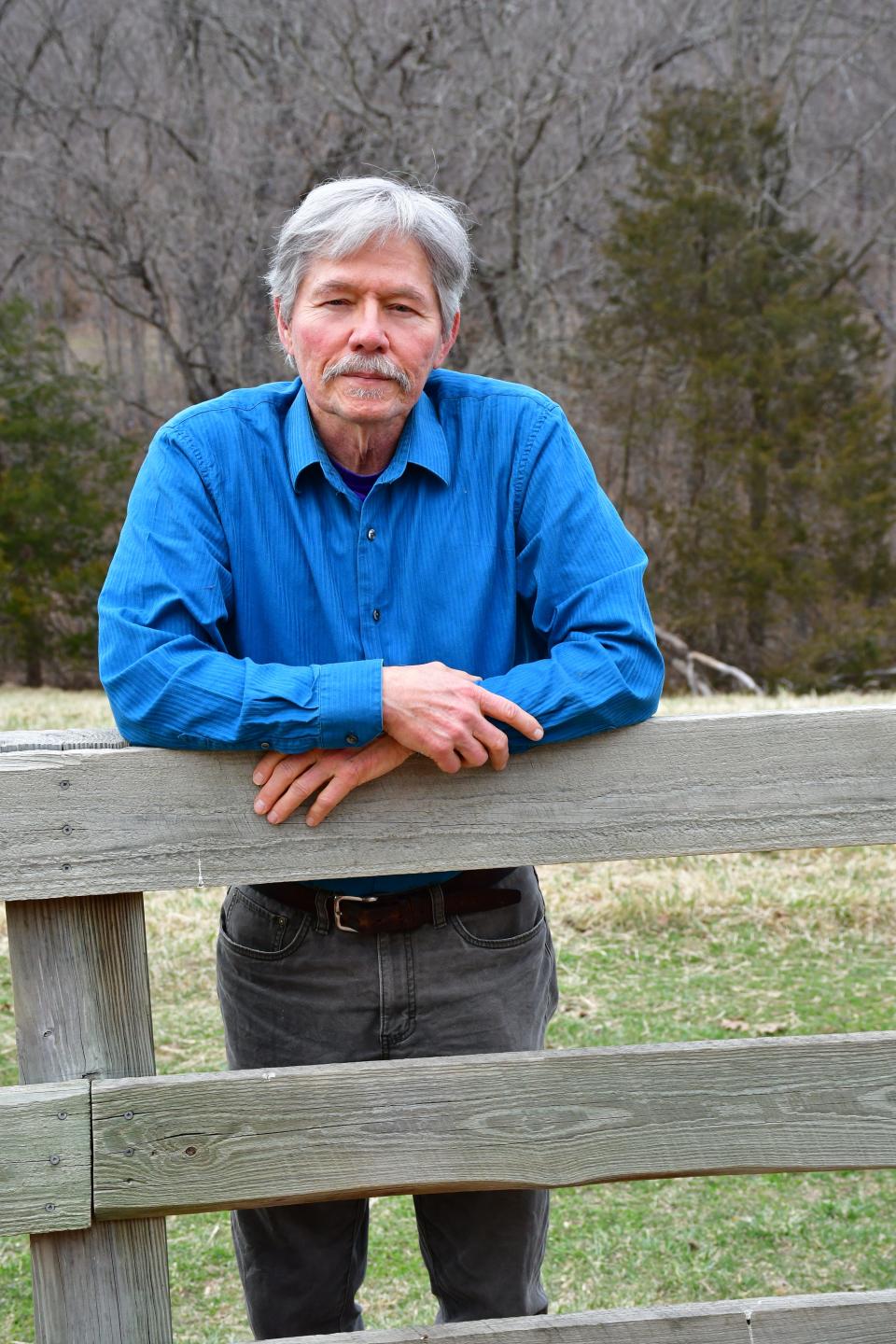How former Missouri poet laureate Walter Bargen walks beside readers in new book
- Oops!Something went wrong.Please try again later.
A truth, time-tested but easily forgotten or willfully rejected, expresses itself across the early pages of "Too Late to Turn Back," the latest collection from mid-Missourian Walter Bargen, our state's first poet laureate.
Our world hungers for gurus and guides but poets — at least, the most reasonably wise ones — refuse the job. They know what most of us really need are companions.
Life allows us two paces forward, then knocks us back a step, curving our heels. This rocking-horse existence cries out for new ways of noticing everlasting loves and pains; and poets like Bargen offer their curious presence and good company for the road.

The first poems in the collection are travel poems. "Travel Troubles" and "Canceled Flight" describe the perils of getting from anywhere to anywhere else. Travelers and their journeys become one, particular pitfalls personified: "Suitcases bloated with bodies," "a high diver of frustration," a woman whose "voice, pressurized, sinks into lower octaves, a wide wake of scorched syllables."
"Stopping at the Edge of Paradise," another early highlight, expresses some feeling between trepidation and patience; the desire to extend a journey by feet, by seconds, to arrive like Augustine — "at least not yet."
"This has become a place of leaving / as I wander toward it, and in the wind's / one syllable I hear a building sadness / that will never be more than the brush / of summer oaks in the heart of afternoons / that spend all their time preparing / to end," Bargen writes.
Striding beside us, the poet stoops to examine situations from other angles, turns over shards of language to find their gleam, closes one eye to see people differently. Bargen observes the strangeness of our connection to one another, the strangeness of getting along.
In "A Feather in Heather's Cap: B Movie Screen Play," an executive secretary is told over and again how much she favors the new receptionist. "Two coworkers comment on the resemblance. / It's enough to make her quit," Bargen writes, and the strangers get stranger from there.
In "Life With Egrets," Bargen measures the motion between the animal world and whatever it is we're creating: "Surely Mark Twain would say more / About walking on water, knowing how we struggle / With the difference between the almost right word / And the right word, the difference between a firefly / And a bolt of lightning."

Bargen preserves scenes and sense memories in a sort of poetic amber, revelations from large, looping roads and modest paths leading home. He approaches the atmosphere as a sort of oracle, not merely testing the wind but listening to what it and the rain and their effects might have to tell us.
"It's a typical Seattle day: overcast, cold, raining," he writes in "Car Mechanic at Sixty-Six," "the streets reflecting a hard shimmer, / laced with the red and green of changing streetlights. / But it's not the Northwest, / it's the Midwest and most everyone is indoors."
Late in the book, "Rain" chronicles one man's history with the cloudburst: "I've been running for years between days and nights of rain." Bargen pays due respect to nature's priestly mercies and its volatility, comparing a Saturday-night ice storm that "slathers the cedars" to "a rabid animal lashing out in the dark at the dark" in "Prophetic Detail."
Other sights stick to us, sustain us, color in our picture of the world. "An Argument of Sorts" houses one of the book's most glorious and plainspoken moments:
"Walk out at evening, beyond the Rio Grande / and the city limits of Albuquerque, past the eroded / volcanic cones on West Mesa. / Small tongues of dust cough around each step. / Boot heels don't know the difference, the finality / between truth and the extinction of desert turtles."
And the opening line of "Winter Solstice" carves itself into our understanding. "Light falls and no one bends to pick it up," Bargen writes.
The poet doesn't have to be an ecclesiastic to hold his or her own philosophy, Bargen reminds us in lines like this. His philosophy is offered as additional information, not forced upon the reader as doctrine; it sneaks through in turned phrases like "We know the umpire's blind when we're losing / and we always are" from "Indigo Empire."
Bargen simply asks us to sit, really sit, with the sort of recognition which opens "Current Events":
"A fisherman mimics eternity, / His arm rising and falling, whipping / The long history of air alive. / The cigarette butt on the gravel bar / Tells them they will never be first / No matter what they do or think."
"Kant's Dark Matter" leads with one of Bargen's truly great passages. "Has anyone ever found the middle of the night?" he asks. "Why does so much happen then? / For that matter, the dead center of day?"
Sifting the fine stuff of his world, Bargen rebuffs some constants — Monsanto, for one — and welcomes others, such as the sad questions forever embedded in a van Gogh painting.
As the title suggests, the poet knows we can alter our path but cannot abandon this road of existence. Sometimes this knowledge hurts.
"It's hard watching your friends wear down / knowing that we have this peculiar and particular / proclivity for survival that may beat out a feline's / nine lives: heart replaced, new titanium knees and hips, / prostate removed, but only sometimes and then never again," Bargen writes in "Homeless."
But the poet won't forsake us, keeping his readers company through all the pain and strange wonder, across a journey that feels endless but ends all too soon. He wants not to change our lives, but add something to them — and Bargen does this once again, presenting a quiet sort of abundance.
Aarik Danielsen is the features and culture editor for the Tribune. Contact him at adanielsen@columbiatribune.com or by calling 573-815-1731. He's on Twitter @aarikdanielsen.
This article originally appeared on Columbia Daily Tribune: Former Missouri poet laureate Walter Bargen releases new collection

